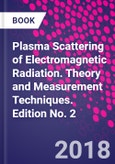Referred to as the "Bible" by researchers, the work encompasses fusion and industrial applications essential in plasma research. It is the only comprehensive resource specific to the plasma scattering technique. It provides a wide-range of experimental examples and discussion of their principles with worked examples to assist researchers in applying the theory.
Table of Contents
1.Introduction; 2.Scattered Power Spectrum; 3.Scattering Spectrum from a Low-Temperature Plasma; 4.Incoherent Scattering from a Low-Temperature Plasma; 5.Constraints on Scattering Experiments; 6.Optical Systems; 7. Scattering from a Low-Temperature Stable Plasma, B=0: Experiment; 8. Scattering for a Magnetized Plasma; 9. Scattering from a High-Temperature Plasma; 10. Scattering from Warm Dense Plasma; 11. Scattering from Unstable Plasma; Appendices: A. Mathematical Methods; B. Kinetic Theory of a Plasma; C. Computational Techniques; D. Review of Work On Scattering of Radiation from Plasmas; E. Physical Constants and Formulas
Authors
John SheffieldJohn Sheffield PhD is known worldwide because of his involvement in numerous multi-national fusion energy projects for the U.S. and Europe. In the 1970s, he was on the design team for the 16-nation, Joint European Torus project at Culham in England; in the 1990s, he served as a U.S. representative on committees that defined and then gave technical advice to the International Thermonuclear Experimental Reactor (ITER)-China, Europe, India, Japan, Korea, Russia, and the United States.
He served on the US-DOE's Fusion Energy Sciences Advisory Committee for over a decade, chairing it from 1996 to 2000. From 1988 to 1994, he was director of Fusion Energy at the Oak Ridge National Laboratory. From 1995 to 2003, he was director for Energy Technology Programs at ORNL, and from 1997 also director of the Joint Institute for Energy and Environment at the University of Tennessee. There he remains as a Senior Fellow in what is now called the Institute for a Secure and Sustainable Environment.
Dustin Froula
Siegfried H. Glenzer
Neville C. Luhmann, Jr.








